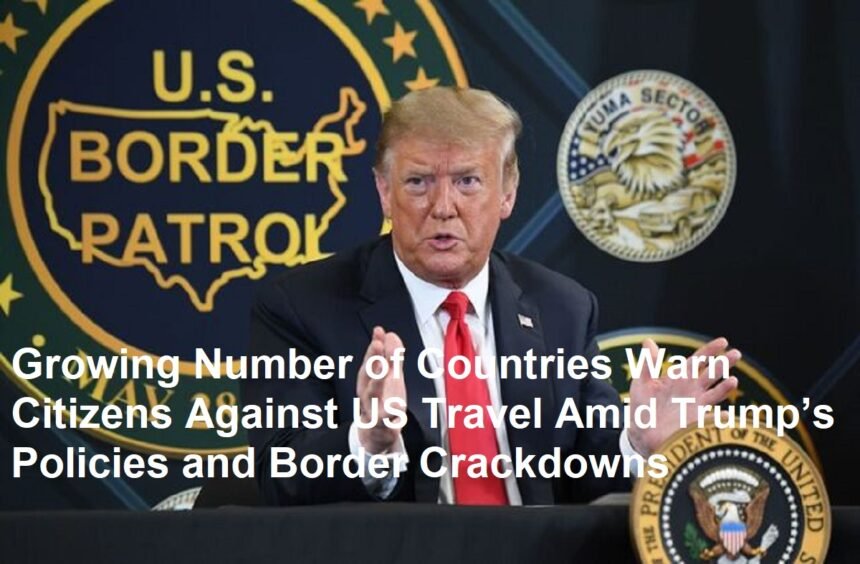In an unprecedented shift, several nations, including Germany, Canada, and Mexico, have issued formal advisories urging their citizens to reconsider travel plans to the United States, citing concerns over the Trump administration’s stringent immigration policies and increased reports of travelers being detained or questioned at border checkpoints. These warnings underscore rising international unease over the US’s approach to border security and its impact on foreign visitors, marking a notable diplomatic challenge for Washington.
Germany: Heightened Scrutiny and Security Concerns
Germany’s Foreign Ministry updated its travel advisory in late 2019, explicitly cautioning travelers about “arbitrary questioning” and “prolonged detentions” at US borders. The advisory highlighted cases of German citizens—particularly those of Middle Eastern or Muslim heritage—facing intensified scrutiny under the Trump administration’s 2017 travel bans targeting several Muslim-majority nations. German officials noted instances of travelers being denied entry over social media activity or unclear visa purposes, with one spokesperson stating, “Travelers should be prepared for rigorous vetting that may exceed previous norms.”
Canada: Racial Profiling and Unpredictability
Canada, the US’s closest neighbor and ally, took the rare step of warning its citizens in 2020 about potential risks tied to “aggressive immigration enforcement.” The advisory specifically referenced cases of Canadian Muslims, dual citizens, and individuals of Iranian, Libyan, or Somali descent being subjected to secondary screenings or denied entry. This followed the high-profile detainment of several Canadians at land crossings, including a tech worker held for 10 hours over suspicions linked to his Syrian heritage. Canadian Prime Minister Justin Trudeau expressed concerns privately to US officials, emphasizing the need for “fair treatment aligned with shared values.”
Mexico: Family Separations and Trauma
Mexico’s warnings, issued amid the 2018 family separation crisis, focused on the “zero-tolerance” policy that led to thousands of migrant children being detained. Though primarily targeting asylum seekers, the advisory also noted incidents of Mexican tourists and legal residents facing harassment. Mexico’s Foreign Ministry urged travelers to carry extensive documentation, warning of “hostile environments” near border states. The trauma of family separations continues to strain bilateral relations, with advocacy groups reporting lasting psychological impacts on affected families.
The Trump Administration’s Defensive Stance
The Trump administration defended its policies as necessary for national security. Former Acting Homeland Security Secretary Kevin McAleenan asserted, “Enhanced vetting protects Americans and ensures compliance with immigration laws.” However, critics argue the measures disproportionately targeted marginalized groups. The travel bans, revised multiple times amid legal challenges, and the “extreme vetting” program, which scrutinized visa applicants’ social media and personal connections, fueled perceptions of xenophobia.
Impact on Tourism and Global Perception
The advisories have had tangible economic repercussions. The US Travel Association reported a 4% decline in international visitors in 2019, costing an estimated $4.6 billion in lost revenue. Cities reliant on tourism, like New York and Los Angeles, noted reduced bookings from European and Canadian travelers. Beyond economics, the warnings tarnish the US’s image as a welcoming destination, with human rights organizations like Amnesty International condemning the policies as “discriminatory and fear-driven.”
International Backlash and Future Implications
The travel warnings reflect broader diplomatic friction. European Parliament members have debated retaliatory measures, while the UN Human Rights Council criticized the US for “eroding humanitarian norms.” Although the Biden administration has reversed some policies, including the travel bans, the legacy of distrust persists. Experts warn that rebuilding the US’s global reputation requires sustained policy overhauls and transparency.
As international allies recalibrate their travel advice, the situation highlights the delicate balance between security and hospitality—a challenge that continues to shape America’s role on the global stage. For now, the advisories stand as a cautionary tale of how domestic policies can reverberate far beyond national borders.












